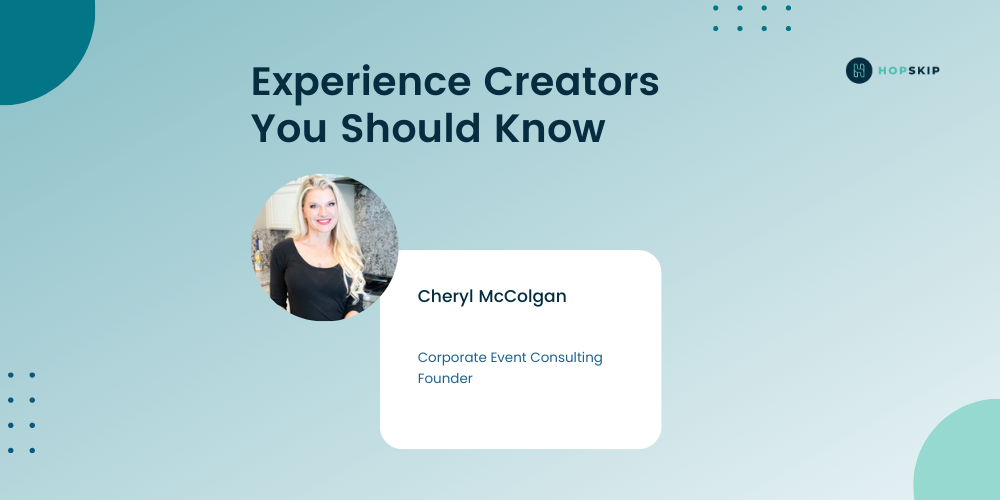Experience Creators You Should Know - Cheryl McColgan, Corporate Event Consulting
Cheryl McColgan, of Corporate Event Consulting, discusses how she honed her skills over the pandemic to now be in position to overcome the challenges that the new meetings/events landscape brings.
Luke Whalin
Jul 5, 2023

This post is part of the HopSkip Planner Spotlight Series where HopSkip spotlights planners across the industry to bring awareness of how they adapted to COVID-19, communicating and lessons learned and sharing how they are viewing the meetings and events industry in a post-pandemic world.
Name: Cheryl McColgan
Company Name: Corporate Event Consulting
Job Title: Founder
Years of Experience: 12
How did you get your start in the events industry? What made you pursue this role?
I originally got into events out of necessity. I was working as the Director of Business Operations at Yoga for Golfers, and we started holding much larger in-person training more frequently. It became part of my role to create all of our event experiences and produce them from inception to post-event evaluation.
How would you describe your role or responsibilities as a professional event planner?
Over the last 12 years, I've been involved in all aspects of events. At times, I've led a large team, and other times, I've been a one-woman show. However, my favorite roles include event strategy and programming. I love creating a product that's easy to market, meets organizational objectives, and serves the attendees' needs.
How do you compare planning your first in-person event post-pandemic, to planning meetings/events pre- Covid? What was different and unique? What was similar?
What challenges have you faced in your work as a meeting and event planner, when working with suppliers or sourcing a venue and how did you overcome them?
It has taken a while for events to come back post-pandemic. For such a long time, meetings and events were taking place on Zoom or video, and I think a lot of organizations got used to that. When I finally planned an event post-pandemic, people were really craving the in-person experience again. Right now, there is really nothing different from pre-pandemic events. If people are attending an event now, they're ready to be there and take any precautions they feel necessary.
I would say my biggest challenges come with venues. Budget is always a consideration, and some venues are not willing to negotiate. These situations can sometimes be overcome with good communication, but often I just have to find an alternative venue.
How do you determine which vendors are best suited for your stakeholder's needs while also finding those providing competitive services at affordable rates?
Research and communication. Often newer venues are more flexible in negotiating their rates which can help with providing more affordability. As for determining which are best suited to the stakeholder's needs, it can require multiple conversations to really understand what they're looking for.
Are there any key lessons or insights that have shaped your approach to event planning over the years?
I would say my biggest tip is to read contracts very carefully. Especially when dealing with a large event, knowing how much you're on the hook for in terms of money is extremely important. Negotiating key dates in the contract is also very important. Try to gain as much time as possible in case you need to modify the amount of space, change locations or cancel altogether. Severe cancellation penalties or missing key deadlines can impact profitability.
Again, communication and follow-up. Don't assume hotels will get back to you in a timely manner. We are all so reliant on email nowadays, but a call is often the best way to get the information you need in the shortest amount of time.
Are you approaching contracting with hotels differently, post-pandemic?
For me, I'm not. I've always done the best I can to make sure I have the maximum amount of time to cancel without penalties.
What is the biggest area of improvement that you think hotels can make when either responding to your RFPs or during the contract phase of your event?
Due to the pandemic, our events community had to evolve, adapt, and grow. Many planners started to embrace new technologies as a result of the pandemic. What new tech are you using today in your planning process as a result?
Since education and relationships are two major pillars in the meetings and events industry, any suggestions on how other planners can learn and network with their peers across the industry?
Providing pictures and or virtual tours of the space is extremely helpful. I've also noticed they don't always include minimum spend amounts automatically so I always ask this.
Less frequent site visits and more video tours, pictures, and layouts.
There are several meeting planner organizations that hold their own events. These are great sources of both education and networking. LinkedIn groups are also a great place to find other planners.